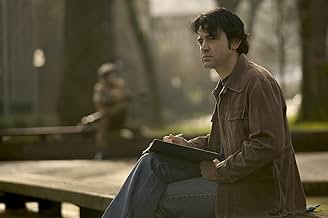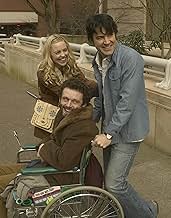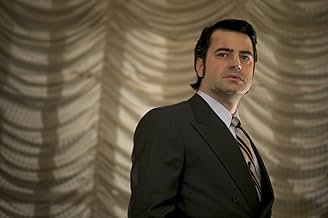VALUTAZIONE IMDb
7,2/10
6140
LA TUA VALUTAZIONE
Aggiungi una trama nella tua linguaRichard Pimentel began his life as a fighter, and his life's work became fighting for the rights of others. After losing his hearing in Nam, he overcame his handicap and used his public spea... Leggi tuttoRichard Pimentel began his life as a fighter, and his life's work became fighting for the rights of others. After losing his hearing in Nam, he overcame his handicap and used his public speaking skills to inspire injured war veterans.Richard Pimentel began his life as a fighter, and his life's work became fighting for the rights of others. After losing his hearing in Nam, he overcame his handicap and used his public speaking skills to inspire injured war veterans.
- Regia
- Sceneggiatura
- Star
- Premi
- 1 vittoria e 1 candidatura in totale
TyZhaun Lewis
- Aaron
- (as Lewis Tyzhaun)
Arlene Ancheta
- Chinese Woman
- (as Arlene Anchette)
Recensioni in evidenza
Are you familiar with the character "Geordi" on Star Trek the Next Generation? He's a blind character on the Starship Enterprise, Chief Engineer. The problem? He just happens to have a visor that enables him to see perfectly, so he's basically no different from a sighted person. Just a gimmick with a goofy visor.
Similarly, in "Music Within", we get a supposedly deaf man, but after a 12-second montage of him learning to read lips, he is absolutely "normal". He understands people just fine (even when their backs are to him), and when they speak to him he looks them in the eye, not the lips (major oversight by actor Ron Livingston). And just like Geordi's visor, he has a mysterious device strapped to his telephone that makes him able to understand everything perfectly (even though we're repeatedly shown that $1000 hearing aids don't work for him).
Why am I making such a big deal of this seemingly insignificant point? Because it undermines the supposed message of the whole story: that disabled people are exceptional *in their own right*. By making the lead character a deaf person who can hear, by making Geordi a blind man who can see, Hollywood glosses over the reality of having a disability thereby reducing it to trivial.
And that's my gripe with this movie; it's has a very "ABC Afterschool Special" feel to it. The producers tackle a difficult subject but only superficially. Just enough to give us a rousing feeling of warmth.
Is that warmth, or is that just my colostomy bag springing a leak again? Sheesh.
Like several other reviewers, I give this movie a thumbs up for a great subject, but I give it a thumbs down for its clunky, superficial and slightly hypocritical presentation. The whole thing feels somewhat contrived.
The scenes showing discrimination are cartoonishly brutal, and it makes you think everyone in the 70s was a tactless creep. I was alive in the 70s, and while I fully agree that disabled people were overlooked, I never noticed the outright hatred that is portrayed in this film. And we're supposed to believe that the American Disabilities Act suddenly made people tolerant & friendly? That's a little too black&white for me to swallow.
On another note, I agree with what another reviewer said about casting Ron Livingston as Richard Pimmentel. The real Richard Pimmentel is a heavyset man. Why couldn't the producers cast someone who weighed 280 lbs like the real Pimmentel? Or did they themselves discriminate based on looks? Sheesh.
One day Hollywood will make a movie about disabled people and cast REAL disabled people. Until then, I won't be impressed by any lofty message they're trying to impart. We can applaud Michael Sheen all day for his portrayal of a man with Cerebral Palsy, but somewhere out there is an actor with real CP who's out of work because directors figure he's too much trouble to work with.
UPDATE A FEW YEARS LATER...
On that last note I just wrote, I finally saw a great film about a disabled (paraplegic) musician which actually stars a real paraplegic actor. Check out "Sympathy for Delicious" a powerful film about a wheelchair-bound 'rockstar' who possibly has supernatural powers. Starring, written and directed by a man who is paralyzed from the waist down in real life, you can count on a genuine presentation without any fake Geordi visors for the blind or magic bionic telephone ears for the deaf.
Similarly, in "Music Within", we get a supposedly deaf man, but after a 12-second montage of him learning to read lips, he is absolutely "normal". He understands people just fine (even when their backs are to him), and when they speak to him he looks them in the eye, not the lips (major oversight by actor Ron Livingston). And just like Geordi's visor, he has a mysterious device strapped to his telephone that makes him able to understand everything perfectly (even though we're repeatedly shown that $1000 hearing aids don't work for him).
Why am I making such a big deal of this seemingly insignificant point? Because it undermines the supposed message of the whole story: that disabled people are exceptional *in their own right*. By making the lead character a deaf person who can hear, by making Geordi a blind man who can see, Hollywood glosses over the reality of having a disability thereby reducing it to trivial.
And that's my gripe with this movie; it's has a very "ABC Afterschool Special" feel to it. The producers tackle a difficult subject but only superficially. Just enough to give us a rousing feeling of warmth.
Is that warmth, or is that just my colostomy bag springing a leak again? Sheesh.
Like several other reviewers, I give this movie a thumbs up for a great subject, but I give it a thumbs down for its clunky, superficial and slightly hypocritical presentation. The whole thing feels somewhat contrived.
The scenes showing discrimination are cartoonishly brutal, and it makes you think everyone in the 70s was a tactless creep. I was alive in the 70s, and while I fully agree that disabled people were overlooked, I never noticed the outright hatred that is portrayed in this film. And we're supposed to believe that the American Disabilities Act suddenly made people tolerant & friendly? That's a little too black&white for me to swallow.
On another note, I agree with what another reviewer said about casting Ron Livingston as Richard Pimmentel. The real Richard Pimmentel is a heavyset man. Why couldn't the producers cast someone who weighed 280 lbs like the real Pimmentel? Or did they themselves discriminate based on looks? Sheesh.
One day Hollywood will make a movie about disabled people and cast REAL disabled people. Until then, I won't be impressed by any lofty message they're trying to impart. We can applaud Michael Sheen all day for his portrayal of a man with Cerebral Palsy, but somewhere out there is an actor with real CP who's out of work because directors figure he's too much trouble to work with.
UPDATE A FEW YEARS LATER...
On that last note I just wrote, I finally saw a great film about a disabled (paraplegic) musician which actually stars a real paraplegic actor. Check out "Sympathy for Delicious" a powerful film about a wheelchair-bound 'rockstar' who possibly has supernatural powers. Starring, written and directed by a man who is paralyzed from the waist down in real life, you can count on a genuine presentation without any fake Geordi visors for the blind or magic bionic telephone ears for the deaf.
The Americans with Disabilities Act (ADA) prohibits discrimination against qualified people with disabilities in employment, transportation, public accommodation, communications, and governmental activities. This act was passed in 1990.
Ron Livingston is Richard Pimentel, born in the late 1940s, and who always had superb oratory skills for his age. He is widely credited with being instrumental in having the ADA established. Richard had been in Viet Nam and there had his hearing destroyed by a close-range blast. Trying to "find his own voice" in life, his own "music within", he eventually realized that it was to help the masses of disabled veterans and then all persons with disabilities.
Rebecca De Mornay is good as Richard's Mom, who suffered from numerous miscarriages and ended up in an institution. Hector Elizondo is good as Dr. Padrow, the professor that told Richard as a young man, go out and find out what you really believe in. Australian Melissa George is good as Richard's girlfriend Christine who found it difficult to get attention away from Richard's causes.
Good movie, well-paced, of a person who has been instrumental in a key chapter of US history, providing equal opportunities for the disabled.
Update Aug 2021: I watched it again on DVD almost 13 years after my first viewing and it was totally fresh. All the good things many reviewers say about the movie are accurate.
Ron Livingston is Richard Pimentel, born in the late 1940s, and who always had superb oratory skills for his age. He is widely credited with being instrumental in having the ADA established. Richard had been in Viet Nam and there had his hearing destroyed by a close-range blast. Trying to "find his own voice" in life, his own "music within", he eventually realized that it was to help the masses of disabled veterans and then all persons with disabilities.
Rebecca De Mornay is good as Richard's Mom, who suffered from numerous miscarriages and ended up in an institution. Hector Elizondo is good as Dr. Padrow, the professor that told Richard as a young man, go out and find out what you really believe in. Australian Melissa George is good as Richard's girlfriend Christine who found it difficult to get attention away from Richard's causes.
Good movie, well-paced, of a person who has been instrumental in a key chapter of US history, providing equal opportunities for the disabled.
Update Aug 2021: I watched it again on DVD almost 13 years after my first viewing and it was totally fresh. All the good things many reviewers say about the movie are accurate.
As a Vietnam Vet with similar disabilities I could relate to what Richard had to go through to be recognized. The movie was funny, but to the point. There should be an Oscar nomination for best supporting actor for Michael Sheen. I previewed Music Within at the film festival in Palm Springs. We were able to question the actors, director and producer at the completion of the showing. That was very instructive. Richard valadated the historic accuracy of the story and the impact Americans with Disabilities had on the Presendenal election for George H Bush. ADA was passed in his administration. The impact of Richard's disabilitiy and his recovery prompted my trip to see the same audiologist and I can now hear much better than with the VA's devices.
Having been a part of the disability community in Washington, DC for twenty years, I can say that this movie is truly remarkable in how it portrays my history and the history of my friends, family members, and the disability community as a whole. This is the history of another civil rights movement. It fairly and accurately provides a brief look at who we as a community are and what drove us to evolve and push for the playing field to be leveled just enough so that people who are blind, Deaf, have CP, or some other disability can actually go to a restaurant and eat pancakes on our birthday...
Ron Livingston oh-so accurately portrays Richard Pimentel's passion and anger as he struggles with his own life and as he learns how to channel that passion to begin making a difference, not only for himself, but for all people. Mr. Livingston also manages to reflect Richard's manner; his facial expressions, his speech, and especially his "stage presence."
Michael Sheen, who portrays Art Honeyman, draws the audience in and makes us all believe that he has CP. His ability to do this, to really become Art, should certainly earn him an Oscar.
I would highly recommend that everyone see this very entertaining and thought-provoking movie.
Ron Livingston oh-so accurately portrays Richard Pimentel's passion and anger as he struggles with his own life and as he learns how to channel that passion to begin making a difference, not only for himself, but for all people. Mr. Livingston also manages to reflect Richard's manner; his facial expressions, his speech, and especially his "stage presence."
Michael Sheen, who portrays Art Honeyman, draws the audience in and makes us all believe that he has CP. His ability to do this, to really become Art, should certainly earn him an Oscar.
I would highly recommend that everyone see this very entertaining and thought-provoking movie.
I went to the LA screening of this movie last night. The director, producer, Ron Livingston, Clint Howard and a few of the crew were there for it. I went in knowing nothing about this movie and must say I loved it! It was a mix of both a great drama and hilarious comedy. It teaches you without being preachy and it seemed to fly by. When it ended I really wanted more, thats something unusual lately. Ron did a great job as well as the rest of the cast, especially Michael Sheen. I think we'll be hearing more about this flick at awards time. If not then thats a real shame. Anyways whenever this film comes out I suggest it for anyone who likes to feel good about life. I know I'll be going to see it again after it opens wide.
Lo sapevi?
- QuizMelissa George's character is introduced in the film while rollerskating at a skating rink; prior to becoming an actress, George was a national rollerskating champion in her native Australia.
- BlooperThe novel "Choke", by Chuck Palahniuk, not published until 2001, is in the bookcase next to Richard as he speaks to Art who has just proofread the manuscript of Windmills.
- Colonne sonoreYou're Nobody 'Til Someone Loves You
Written by James Cavanaugh, Russ Morgan, Larry Stock
Performed by Dean Martin
I più visti
Accedi per valutare e creare un elenco di titoli salvati per ottenere consigli personalizzati
- How long is Music Within?Powered by Alexa
Dettagli
Botteghino
- Lordo Stati Uniti e Canada
- 154.087 USD
- Fine settimana di apertura Stati Uniti e Canada
- 52.744 USD
- 28 ott 2007
- Lordo in tutto il mondo
- 187.581 USD
- Tempo di esecuzione1 ora 34 minuti
- Colore
- Mix di suoni
- Proporzioni
- 1.85 : 1
Contribuisci a questa pagina
Suggerisci una modifica o aggiungi i contenuti mancanti

Divario superiore
By what name was Music Within (2007) officially released in India in English?
Rispondi

























